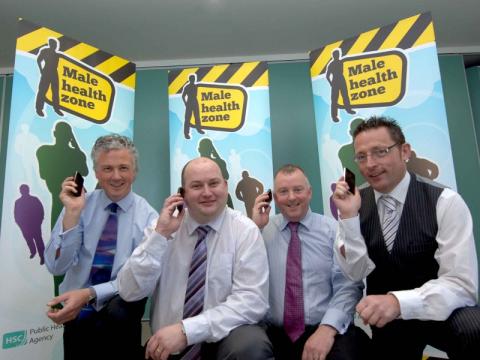Shorter life expectancy for men in southern area

A new report, launched today (during Men’s Health Week), entitled: “Men’s Health Report – Southern Area Perspective’ has highlighted that men living in the Southern area of Northern Ireland have a shorter life expectancy than those living in the rest of Northern Ireland.
Life expectancy in males in Northern Ireland in 2005-2006 was 76.2 years, however, for some across the Southern area (Armagh, Dungannon, Newry and Mourne) life expectancy was less than 70 years.
To tackle this health inequality, the Southern Investing for Health Partnership (a partnership supported by the Public Health Agency) has held a seminar examining key facts about the status of male health in the area to find ways to improve the life expectancy of males in the Southern area.
Highlighting some of the key findings from the report during today’s event, Una Cushnahan, Development Manager with the Agency said: “The findings of this report highlight the top causes of death across amongst men in the Southern area and some of the reasons why an inequality exists between men and women."
Some of the key findings within the report include:
• death rates for 2008 in the Southern area were higher for males than females;
• males had a higher rate of death from heart disease, road traffic collisions and suicides than Northern Ireland males as a whole;
• whilst the male death rate due to Ischaemic Heart Disease (IHD) has decreased over the past ten years it is still the number one cause of death in men in the Southern area;
• male death rates due to cancer of the throat and lungs has generally increased over the past ten years;
• during 2008, there were 69 suicide deaths across the Southern area alone (282 in Northern Ireland). Of these 69 deaths, 77% were male and 23% female;
• in the same year, accidental injury accounted 4.5% of deaths in men in the Southern area, 78% of all accidental injury deaths were male victims and of these 57% were aged less than 30 years.
Una concluded: “Males, in general are infrequent users of health services, especially their GPs and primary care. They visit the doctor less often, have shorter consultations and tend to see their GP later in the course of their illness than females.
“Some of the current initiatives that have been delivered or planned for delivery across the area to help improve this health inequality in males in the coming months include; cancer awareness initiatives in workplaces; additional clinics in GP practices outside of normal working hours and health awareness evenings in conjunction with local primary schools targeting fathers and male guardians.”
Also speaking at the event, Mary Black, Assistant Director of Public Health, Health and Social Wellbeing Improvement with the Agency added: “Changing the pattern of health inequalities demands a concerted effort from agencies working together with local communities. This pattern can be different if we as a society work together to tackle some of the root causes. Information from today's report will help us do just that and I welcome the attention given to men's health during this week.”
A number of the recommendations emphasised in the report include developing strategies to find new and innovative ways to provide primary care services for men; developing focused approaches for ‘new dads’ through health visiting i.e. when visiting mum and new baby; promoting training designed specifically to help primary care practitioners to address the unique needs of men and to develop targeted awareness campaigns.
To download a copy of the report log onto the www.southernifh.com and click on the publications section.
For press enquiries contact: Shirlie Murtagh, Acting PR Manager. Tel: 028 3741 4531 / 07792947733.
Source: Men’s Health Report – Southern Area Perspective. Public Health Agency.
